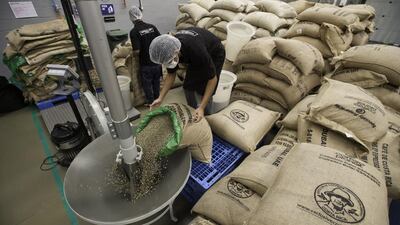Coffee Planet is a challenger in a huge market. The Dubai-based company is expanding beyond its homeland in the Emirates, taking with it a culture that ensures a strong brew of customer satisfaction and sustainability.
DUBAI // One of the region’s most recognised coffee brands is a made in the UAE success story that has built itself with a focus on sustainability.
Coffee Planet, based in Al Quoz, Dubai, was built from the ground up to become a multinational enterprise, roasting more than 45 tonnes of coffee a month and selling more than 15,000 cups daily through its outlets in the region.
“There are a number of fantastic coffee producers in the GCC region, but there are no other coffee companies which provide a complete approach like Coffee Planet,” said managing director Robert Jones, who describes the business as “a vibrant symbol of the entrepreneurial spirit that is alive throughout the GCC”.
“Coffee Planet targets people who are passionate coffee drinkers and appreciate being served delicious, freshly roasted coffee.”
Established 10 years ago by his father, his brother and a business partner – who began by selling cups in petrol stations – the company has a focus on sustainability, an industry trend that continues to place importance in organic and fairly traded products.
Coffee Planet now sells coffee through its own-branded outlets, supplies wholesale to a range of customers like Emirates and Etihad, and also produces single-serve capsules used in Nespresso-style machines.
The facility is UTZ certified, a programme that aims to promote sustainable farming practices and improve returns for farmers of coffee, cocoa and tea, said Mr Jones.
“Producing good quality coffee is Coffee Planet’s number one priority, which is why beans are sourced directly to ensure full traceability of the green beans,” he said.
They source their “speciality” grade beans – grown at an elevation of at least 1,700 metres above sea level – from more than 20 countries in Africa, Central America, as well as Indonesia and India, which are passed on to customers on a “roast to order” basis.
“(Jebel Ali Free Zone) offers fantastic opportunities for businesses to operate manufacturing facilities in order to benefit from the infrastructure they have implemented, so we were fortunate to secure a location with them, and their assistance was very beneficial to us,” he said.
The company has moved beyond its birthplace, exporting to franchise partners in Oman, Pakistan, Malaysia and Azerbaijan, as well as signing up distribution partners across the GCC, Europe, Africa and the United States.
“The challenge is that rules can often change in terms of export regulation which can cause us issues at times but nothing that simple changes in our processes can’t handle,” Mr Jones said.
This year, they established a joint venture in Qatar.
“In 2015, the roastery premises will double to ensure capacity as we move forward with our plans to extend the Coffee Planet footprint into new markets,” Mr Jones said.
______________________________________________________________
Made in the UAE
An increasing flow of locally produced goods is positive news for the UAE’s energy dependent economy, but increasing manufactured exports will require overcoming some significant obstacles. Oil and gas, which accounts for 40 per cent of the country’s GDP, has long held the banner for the “made in the UAE” label, but plunging oil prices have once again exposed the perils of having an economy driven by a single powerful industry.
This five-part series profiles companies, products and goods, all made in the UAE.
■ Made in the UAE: New champions of UAE industry
■ Made in the UAE: Credibility supplied by Strata's high flyers
■ Made in the UAE: Video game studio helps country reach next level
■ Made in the UAE: Al Foah puts Emirati dates on the map
■ Made in the UAE: Steel producers galvanise local market
esamoglou@thenational.ae

